How to stop spending money on unnecessary things? How do you create better spending habits?
Every day, most of our actions are performed out of habit. We live almost half of our lives habitually and this is when we behave automatically in the very same ways we’ve behaved before.
Anyone who would want to improve their finances has to start by improving their spending habits because habits determine the most important aspects of our lives.
The truth is, habits control our lives, whether it’s your morning routines, spending habits, or exercise routine they influence the way we live, and we all know that, but habits are often overlooked. I understand this because forming better habits can be pretty tough. It is just hard to be consistent about it. But I’ve got good news for you!
Drawing wisdom from all the financial books and articles I have read, this article lays out what you need to form better spending habits to achieve whatever financial goals you have. I’d love to share my expertise and experiences so you can be better at money and lead a more satisfying life.

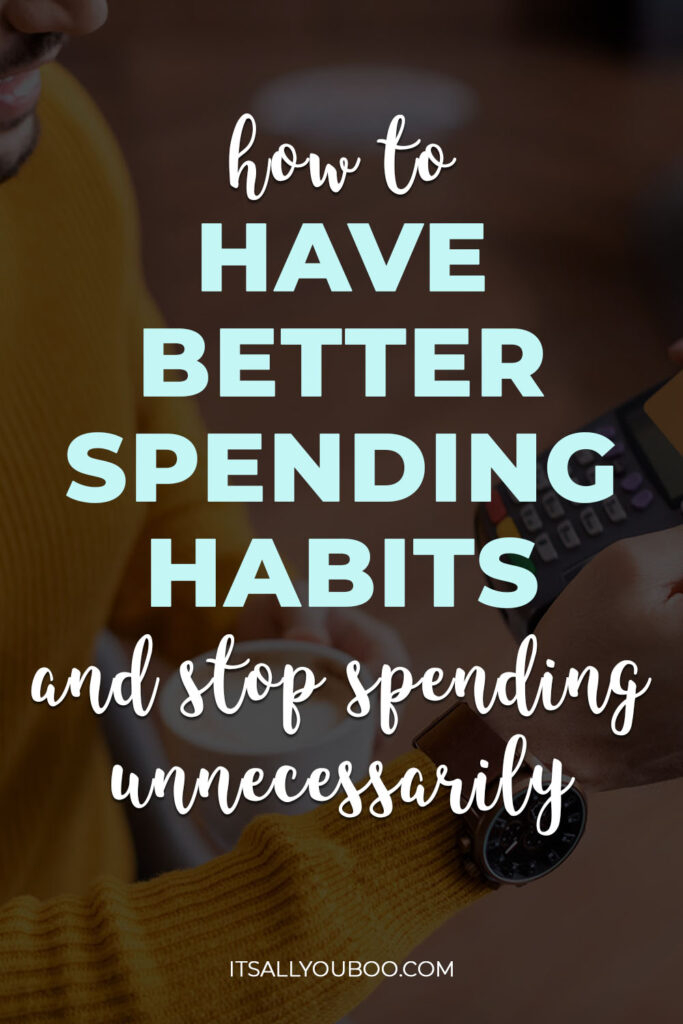
THIS POST MAY CONTAIN AFFILIATE LINKS.
IF YOU MAKE A PURCHASE FROM THESE LINKS, I MAY EARN A SMALL COMMISSION.
CLICK HERE FOR MY FULL DISCLAIMER STATEMENT.
Types of Spending Habits
Before we dive into how you can have better spending habits, it is important to know the types of your spending habits. Self-awareness is powerful, because when you know yourself then you can plan out what you can do about it.
Drawing on meQuilibrium’s article, there are 7 money types and their spending habits. Which of these types do you fall into?
👉🏽 RELATED POST: Top Bad Habits to Unlearn
#1. But, What If… Type
If you are this type, then preparing for the worst scenario such as bankruptcy or unexpected sickness is important to you. You would spend a lot of time worrying about the worst cases of “what if”.
You’re constantly thinking about questions like:
- What if the economy gets bad or the stock market goes worse?
- What if I lose all my assets and end up broke?
- What if my new business won’t get any profit?
Elior Moskowitz in her article gave a few pieces of advice on how to manage these spending habits too. She mentioned always clear your mind before making financial decisions and taking action because good financial decisions rarely happen in the heat of the moment.
👉🏽 RELATED POST: Copy This Realistic Budget For College
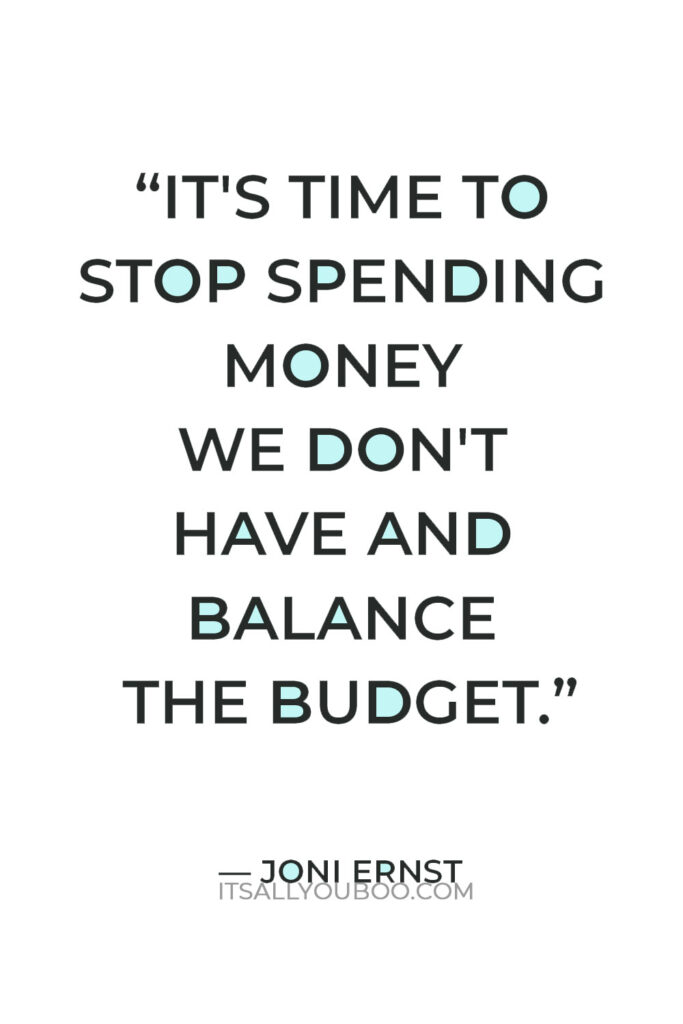
#2. Just Have a Good Time Type
I know a few friends who are guilty of this.
Their mindset is that money is meant to be enjoyed and used at the moment. Money is a tool used in exchange for good experiences so you can enjoy living. If you’re this type you like to splurge on trips, food, events, and anything the brings you pleasure.
However, the pitfall of this is the tendency to spend impulsively.
👉🏽 RELATED POST: How to Cut Spending and Still Have a LIfe
#3. The Safe and Secure Type
This might be the most common type of person I know.
My parents taught me to always have savings in my bank account because it provides safety. They believe that the more money you save, the safer you feel.
That you should always have enough amount of money in your bank to survive for at least three months in case you lose your job will make you sleep at night. This type prioritizes building an emergency fund, having a rainy day fund, or investing in life insurance policies.
👉🏽 RELATED POST: 5 SMART Financial Goals Examples
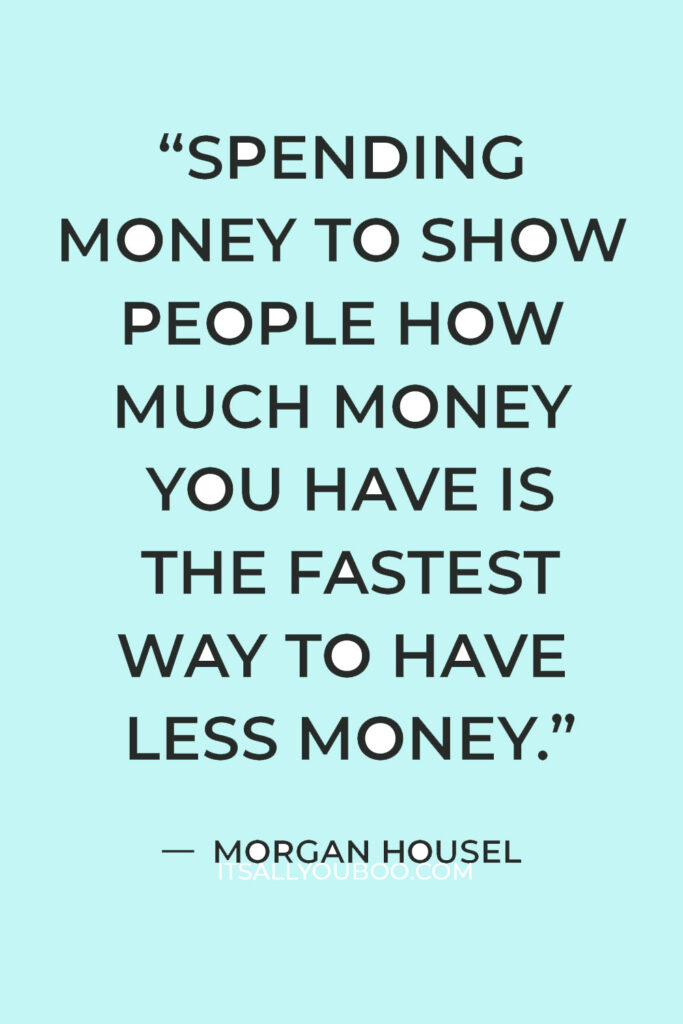
#4. Status Symbol Type
If you go out for lunch with a friend and come down to paying the bill, would you split the bill equally? Or would you volunteer to pay the bill? If your answer is the latter, then this is your spending habit type.
You think that having enough money is required for respect. You show pride and recognition by taking the responsibility to pay the bill for your friend. You also like to show off, with designer bags, expensive accessories, luxury cars and of course home to impress.
👉🏽 RELATED POST: How to Quit Keeping Up with the Joneses
#5. The Clueless Type
This is when you get easily overwhelmed by financial matters and you don’t have full control of your money yet. I was this type five years ago when I had my first job and moved to a new country.
I’ve bad financial situations in my first year as a worker because I couldn’t handle my money well. I had no control of my salary, and it was just wasted on unnecessary things.
During this clueless phase, I would instantly go shopping on salary day because I felt rich, then I end up buying things I don’t need. I also had no budget plans which is not a good spending habit. The result? I was left with five dollars in my wallet the day before the next payday.
This type is often oblivious to not only how money works but constantly makes bad decisions unaware of any consequences. They live paycheck to paycheck and could have lots of credit card debt.
👉🏽 RELATED POST: 4 Financial Tips for College Students To Save
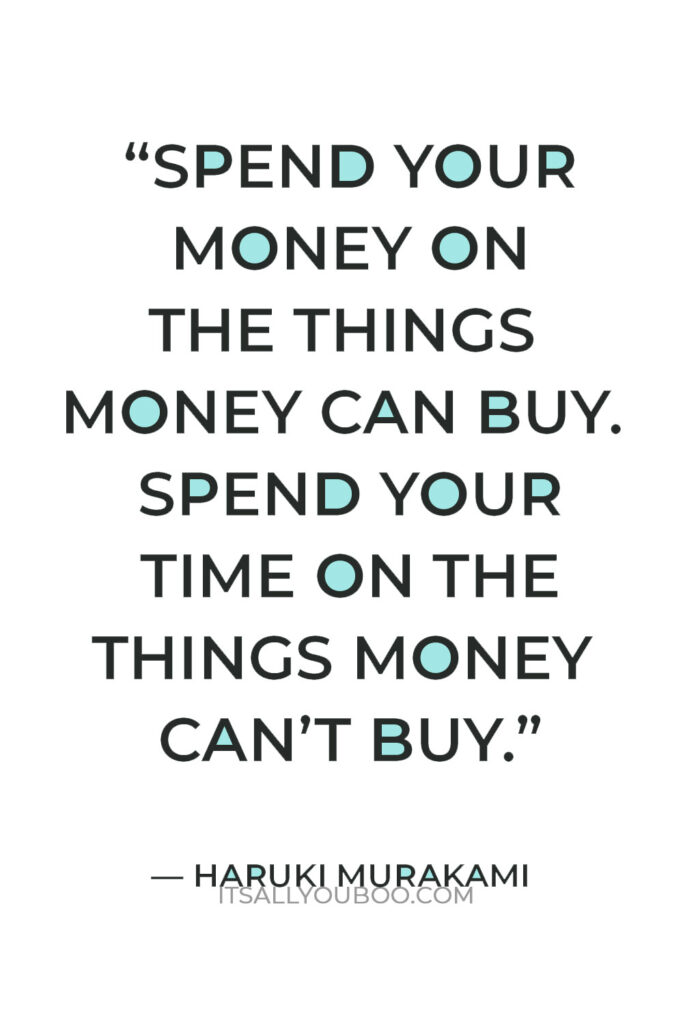
#6. The Giver Type
This is your money type if you use your money to help others who are in need. You think that the most beneficial use of money is to assist others. Spending your extra money to help others brings you joy, and you devote your time to make other people’s lives easier.
You can help others in many ways, big or small. For me, I help my family by sending my younger brother to university. I helped a friend by hiring her as my virtual assistant and pay her. Are you this type? If yes, what do you do with your money to help others?
The giver donates regularly to charities, worthwhile causes, and to support their friends and family.
👉🏽 RELATED POST: 4 Debt Reduction Strategies that Work
#7. The Powerbroker Type
This is the last of our spending habit types list. When you achieve financial success, you try to make a difference in this world. You can use your money to make an impact and create something valuable such as founding a charity, like building homes for the homeless.
You basically use your financial success to make an impact on the world.
What’s Your Bad Spending Habit Type?
In 2019, I was forced to find a new job because my company went bankrupt and had business closure. I had to look for a new job within a short period of time. I was lucky and got another teaching job, however, my salary was a bit lower. The same year, I reached rock bottom and got myself into a deep hole of debt. I blamed my lower salary for this.
However, when I decided to make a change and map out my path to my own rescue, it was nothing to do with my salary and why I got myself into a huge debt. It was solely because of my bad spending habits. I realized that the 2-dollar-latte and breakfast I buy every morning add up and it turns out I spend a whopping 250 dollars a month on my way to work.
This type of spending habit falls under spending habits type 2 since I really like coffee and I enjoy having a sip of a latte on my way to work. It is a bad spending habit when you’re trying to save money, so I needed to stop immediately.
The good news about building habits is that habits are malleable. You can always lose bad ones and replace them with better ones. And the first step is self-awareness. Know your type of spending habits and have a better understanding of yourself so you can map out plans of improvement.
So, what type of spending habits do you have? Knowing is your first step to stop spending on unnecessary things. No one is saying you can’t have a daily coffee, but if you’re in debt and need to cut spending quickly, making your own coffee can save you big.
👉🏽 RELATED POST: Why I Stopped Spending Money

How to Have Better Spending Habits
Do you think you have better spending habits? If your answer is yes, congratulations! But if you say no, don’t fret because everyone can work to achieve this state.
The pandemic showed us that unpredictable things happen at any moment, and we need to be financially whole and ready. So here are 7 steps on how to create better spending habits and take control of your spending.
#1. Write Down Your Financial Habits
Your approach to money didn’t come out of anywhere. It is shaped by your habits and your environment. So, look for bad and good patterns and list them down.
This is easy to do when you have an expenses tracker. Keep all the receipts of your purchases and record them at the end of the month. Be honest where these come from and write down what they make you feel.
When I got myself into huge debt, I got into its roots by printing my credit card expenses list and highlighting the unnecessary things that just derail me from my financial goals.
Having a solid budget plan will help you realize your spending habits. Your budget will determine how much income you make and your fixed and variable expenses. It requires a self-diagnosis and visualization of your day. Note everything, then assess your expenditures.
👉🏽 RELATED POST: 20 Financial Goals for the New Year
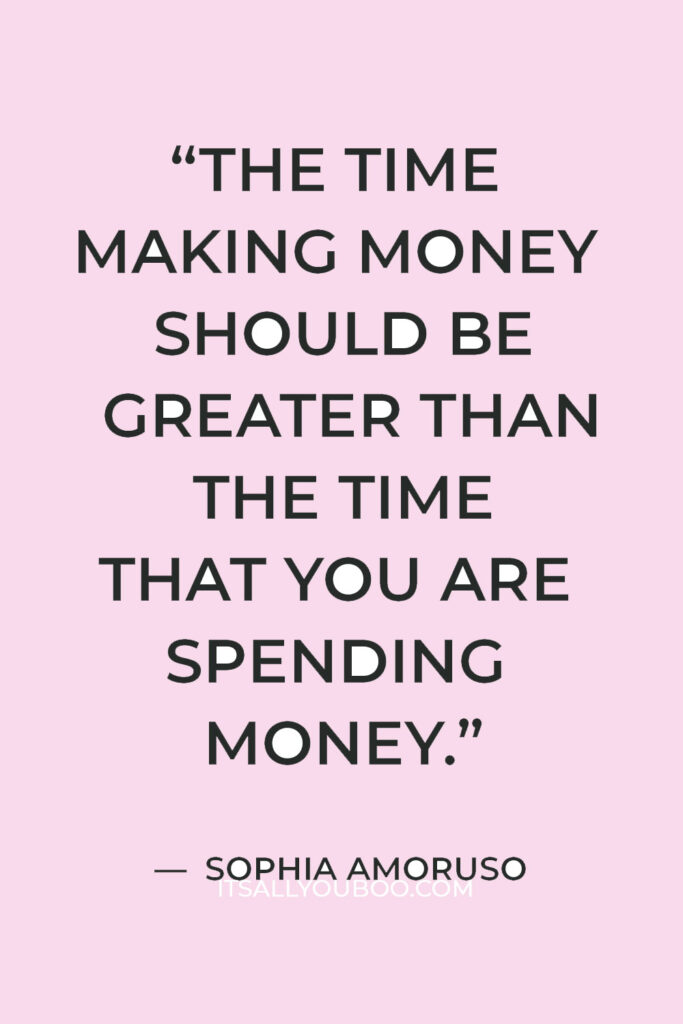
#2. Surround Yourself with Positive Accountability
In Gretchen Rubin’s book Better than Before, she reveals personality types in building habits and making your life better. One of the personality types is being an Obliger.
These are types of people who deal well with outer expectations but struggle on their own. It is hard to build habits of your own will, you need accountability partners such as coaches, friends, or family to support you and help you achieve your goals.
This concept can also be applied to having better spending habits. Think about the people you spend most of your time with, do they support you or drag you into bad spending habits? If not, you gotta replace them with people who support you.
As the saying goes, birds of a feather flock together. If your friends have better spending habits, you will likely be influenced to have better ones too so surround yourself with people who you can count on.
👉🏽 RELATED POST: Improve Your Money Mindset
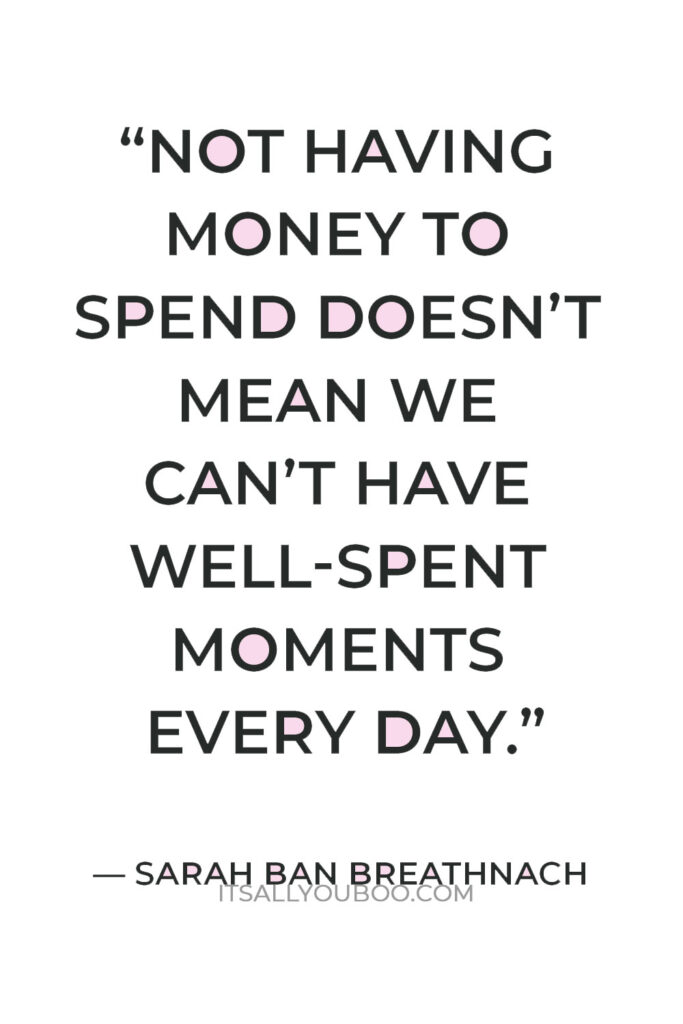
#3. Follow the 50-30-20 Budget Rule
Anyone can create better spending habits with the 50-30-20 budget rule. If you are struggling to budget your money, then this is for you. This is your guideline to have a good financial budget. Let’s get into the details of this rule.
What is the 50 30 20 budget rule?
This rule was popularized by Senator Elizabeth Warren, according to Investopedia. Use this rule to allocate your budget accordingly.
- 50% goes to your needs such as food, shelter, and fixed bills.
- 30% goes to your wants such as having nice clothes, car, computer or local travels while
- 20% is for your financial goals such as emergency fund, savings or debt.
Now you can’t really do anything else with your needs, but you can do a lot on your wants. You can adjust your lifestyle and make improvements to the things you buy. There are so many things you can stop buying.
The final step to budgeting is automation. For savings, automation can help so much. You can create an account for emergency funds and long-term goals. Setting up all your deposits and payments for debts not only saves time but also makes you better at handling your money.
👉🏽 RELATED POST: How to Achieve Your Financial Goals
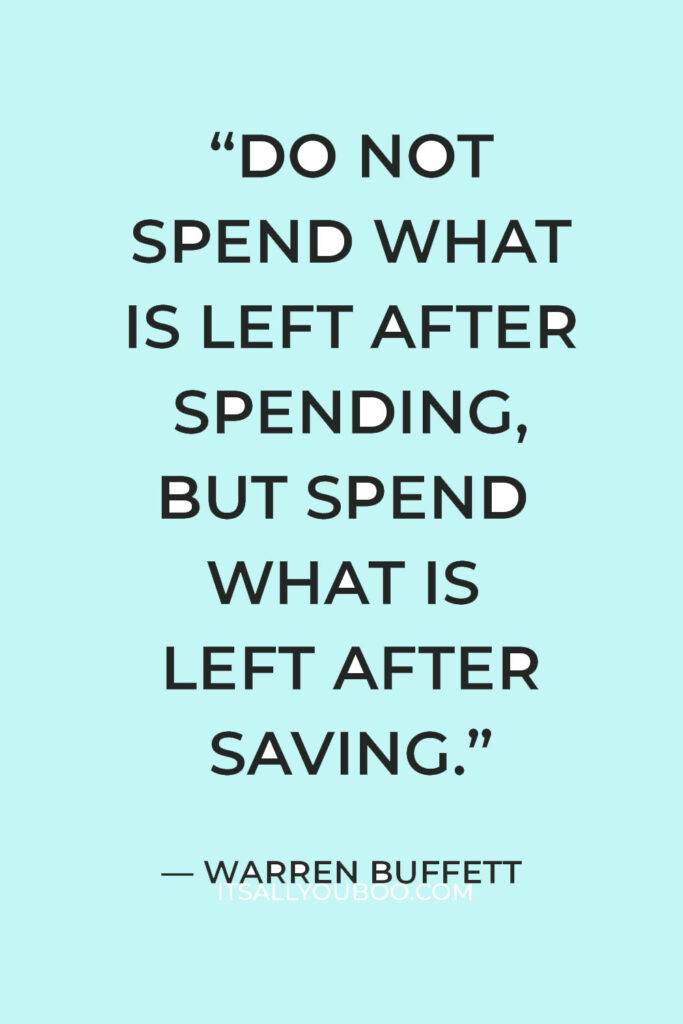
#4. Don’t Spend to Save Money But Save to Make More Money
In human behavior, it is common to splurge when times are good. When we are happy, we go shopping. When we get bonuses, we like to splurge on things, you know the I deserve things mindset or live for the moment. But when you are trying to improve your spending habits, you have to practice mindfulness and curb impulses.
My current read, Get Good with Money by Tiffany Aliche, teaches that we should shift our habits from saving to spend money to saving to make more money. You do not save just to spend it but save to invest or use it as a cushion for the future.
Practice mindful spending to save money and use that money to invest. Before buying things, ask yourself first if this will bring you joy or value.
List your savings as new bills and try to be consistent with your deposits.
👉🏽 RELATED POST: Is it Better to Save Money or Pay Off Debt?
You Can Create Better Spending Habits
Creating better spending habits can be tough but by understanding your spending habit types and following these tried-and-true steps, you can achieve this goal.
Creating a solid budget will set your foundation for building good habits. Find an accountability partner and surround yourself with people who support your goals and remember to follow the 50-30-20 rule.
Get Your Simple Budget Spreadsheet
Ready for your budget for better spending? With the Simple Budget Spreadsheet, you’ll be able to track your expenses and savings It’s easy to use and compatible with Google Docs and Microsoft Excel.
Keep in mind, save so you can have more wealth and use that wealth to work for you by investing.

Ready to have better spending habits?

More About Guest Contributor
I’m Ali, the creator of the Share to Inspire blog. I am a 27-year-old self-growth enthusiast. I have a burning passion for improving myself, building confidence, ditching fear, and living the life I have designed. I created this platform to share my passion and hope to inspire and empower women in the aspects of self-growth, finances, and relationships.
Last Updated on April 21, 2025










Mimi says
I need this because I’m TERRIBLE at savings. Im always shopping I’m thinking I need therapy because it’s getting out of control
Alita Pacio says
Thanks Mimi, Im glad you find it helpful
Nadalie Bardo says
Hey Mimi,
Haha, I feel you on that one. I used to be the worst at saving, until one day I quit spending.
joy abou zeid says
This is very helpful!! thanks for sharing! Also, I definitely type 3
Alita Pacio says
Thank you Joy. Knowing your type is really helpful in creating better spending habits
Nadalie Bardo says
Hey Joy,
Thanks so much for sharing which type of spender you are with us. I feel like over our lifetimes we can be all of them.
Vidhi says
Love all your tips for having better spending habits. They are so helpful.
-Vidhi
Nadalie Bardo says
Hey Vidhi,
So happy you found these better spending habits helpful! Happy saving!
Patricia @ Grab a Plate says
What an informative post! I see myself in a few of those categories. COVID has been good to help me realize how I’ve been spending money, typically. Thanks for the tips!
Nadalie Bardo says
Hey Patricia,
Right?! Alita did such a fabulous job sharing how we can get our spending under control.
Mallory says
I have been working on having better spending habits and these are great ideas! Thank you!
Nadalie Bardo says
Hey Mallory,
Happy to hear this is helpful! Happy saving!
Renee says
Love this post! I am a saver and hubby is a live in the moment type. These two together is rough.
It's All You Boo says
Happy to share to you both these better spending habits, Renee! Hopefully you get what you need to form better spending habits! Thanks!
Amber Myers says
Oh gosh, I am working on this. I do like to shop, but I am working on having better spending habits and saving more. You have great advice!
It's All You Boo says
Happy to share all these advices to you, Amber! To improve our finances we need to start looking at our spending habits.
Whitney Stewart says
Thankfully I learned good spending had it’s from a very young age by my parents; but this is still sound advice. I’ll definitely use it!
It's All You Boo says
It’s good that you’ve mastered good spending since you are young, Whitney! Thanks for being here!
Rose Ann Sales says
This is a really great post! I have been working on having a great and better spending habits. Thanks for sharing this with us!
It's All You Boo says
Happy to help you with your spending habits, Rose Ann! Self awareness is powerful!
Monica Simpson says
I always have to have something in our savings account. It helps my anxiety a lot!
It's All You Boo says
That’s good, Monica! These tips on how to have better spending habits will help you more manage your finances.
Sharon says
It can be hard to stay on a budget, especially during the holidays. These are great tips for how to spend and save wisely.
It's All You Boo says
Yes, the holiday season always keeps us out of budget most of the time. These tips on how to have a better spending habit will definitely help, Sharon! Thanks!
Tisha says
Definitely something I need to work on, this is great
It's All You Boo says
Hey Tisha! Go ahead and apply these tips on how to have better spending habits and work your way on improving your finances! Thank you for dropping by!
Julie says
This is such an important message! Great advice to get control of money. Bookmarking to reference this again.
It's All You Boo says
I’m happy that you love these tips on how to have better spending habits, Julie!